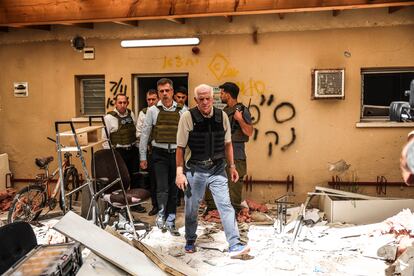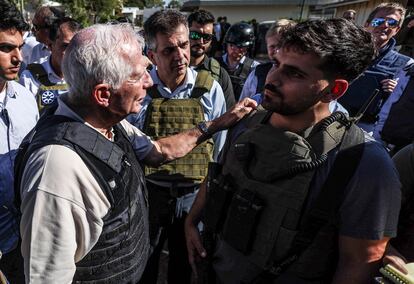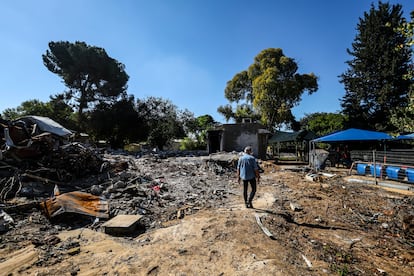In Israel, EU foreign affairs chief delivers Europe’s most critical message so far: ‘One horror does not justify another’
Josep Borrell stresses that ‘all human lives have the same value’ after pointing out that innocent civilians, including thousands of children, have died in recent weeks


During a trip to Israel Thursday, November 16, EU foreign affairs chief Josep Borrell delivered the most critical message heard so far from a representative of the European Union regarding Israel’s response to the Hamas attack of October 7. “Not far from here is Gaza. One horror does not justify another,” he said in a statement to the media alongside Israeli Foreign Minister Eli Cohen, with whom he had just toured Kibbutz Beeri, where Palestinian militiamen killed and kidnapped dozens of people. “I understand your fears and your pain,” he said. “I understand your rage. But let me ask you not to let yourself be consumed by rage. I think that is what the best friends of Israel can tell you, because what makes the difference between a civilized society and a terrorist group is the respect for human life. All human lives have the same value.”
Cohen, who was listening intently to the EU foreign affairs chief, had just finished pointing to Hamas as “solely responsible” not only for the 1,200 Israeli fatalities but also for the more than 11,000 Palestinian deaths in Gaza as a result of the Israeli bombardments.
Borrell has a personal connection to this region of Israel and to kibbutz life, which he flagged up at the beginning of his speech. “I know what a kibbutz means to Israelis,” he said, adding that, in 1969, he spent a summer volunteering on a kibbutz due to a desire to “contribute to the spirit of hope, peace and solidarity” that they represent. “So I understand what the kibbutz family feels when their sons, parents or daughters are kidnapped,” he said, alluding to the 240 hostages held in Gaza by Hamas. It was from this place of familiarity and deep affection that he urged Israel to establish humanitarian pauses and, “at a certain point,” to put a definitive end to hostilities.
Cooperative farms that emerged as part of the Zionist movement, the kibbutz were inspired by socialist ideals and so attracted volunteers from other parts of the world for many years. It was, Borrell revealed, during his time in a kibbutz that he married for the first time, noting with pride that one of his sons speaks Hebrew.

Borrell insisted that “nothing justifies what Hamas terrorists did,” that Israel has a right to defend itself and that Hamas “must be defeated.” But he also made it clear that “Hamas does not represent the Palestinian people” and pointed out that Israel must act in line with international law and, in particular, international humanitarian law and that “innocent civilians, including thousands of children, have died in recent weeks.” He went on to say, “One thing is to take care of Israel and another thing is to take care of the people in need. This is why the European Union, while supporting the right to defend Israel, is also asking for humanitarian assistance for food, water, fuel and protection.”
Stressing the need for a peace agreement with the Palestinians, the EU foreign policy chief pointed out that the Israeli military fortress and the barrier around Gaza, in which Israel has invested more than €2 billion, did nothing to prevent the surprise attack by Hamas. “We have seen that walls and technology, and soldiers, are not enough to make Israel secure,” he said. “I was talking to an Israeli reserve officer who told me: “No army can protect a nation better than peace can do.”

Borrell’s visit, during which he listened attentively to those on the kibbutz who lived through the October 7 attack, is his first to Israel since he took office in 2019. Israeli diplomacy had unofficially vetoed Borrell, accusing him of bias regarding the Israeli-Palestinian conflict and of interfering in internal affairs with regard to the controversy over Benjamin Netanyahu’s judicial reform earlier this year. A face-to-face meeting in Brussels in May with Cohen went some way to repairing relations and a date was set for Borrell’s visit, which was then cancelled due to the war.
Borrell’s rescheduled visit is also significant in that it includes the West Bank city of Ramallah, where he will meet the Palestinian president, Mahmoud Abbas, his prime minister, Mohamed Shtaye, and the foreign minister, Riad Al Malki, on Friday. He will be the first EU representative to visit the West Bank since the October 7 Hamas attack. Neither the President of the European Commission, Ursula von Der Leyen, nor the President of the European Parliament, Roberta Metsola, have done so.
The visit to the West Bank is inevitably colored by the unease triggered by Von der Leyen’s unmitigated defense of Israel, and the unilateral decision of the Commissioner for Neighborhood and Enlargement Affiliation, Oliver Varhelyi, to temporarily suspend development aid to Palestine, a decision that was reversed following protests from several member states. On October 18, Borrell made it clear in a speech to the EU parliament that being able to visit Ramallah was a “fundamental condition” of any trip to Israel. “If I visit Israel, I must also visit Ramallah. Unfortunately, the current tensions and the events we are experiencing have made this impossible,” he said.
A month on, Borrell’s tour will include Bahrain, Saudi Arabia, Qatar and Jordan, countries with the capacity to mediate in the conflict.
Sign up for our weekly newsletter to get more English-language news coverage from EL PAÍS USA Edition
Tu suscripción se está usando en otro dispositivo
¿Quieres añadir otro usuario a tu suscripción?
Si continúas leyendo en este dispositivo, no se podrá leer en el otro.
FlechaTu suscripción se está usando en otro dispositivo y solo puedes acceder a EL PAÍS desde un dispositivo a la vez.
Si quieres compartir tu cuenta, cambia tu suscripción a la modalidad Premium, así podrás añadir otro usuario. Cada uno accederá con su propia cuenta de email, lo que os permitirá personalizar vuestra experiencia en EL PAÍS.
¿Tienes una suscripción de empresa? Accede aquí para contratar más cuentas.
En el caso de no saber quién está usando tu cuenta, te recomendamos cambiar tu contraseña aquí.
Si decides continuar compartiendo tu cuenta, este mensaje se mostrará en tu dispositivo y en el de la otra persona que está usando tu cuenta de forma indefinida, afectando a tu experiencia de lectura. Puedes consultar aquí los términos y condiciones de la suscripción digital.








































